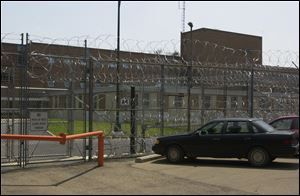
COMMENTARY
Crazy race to incarcerate
10/7/2012Last week’s debate offered President Obama and Republican challenger Mitt Romney a chance to put one of the nation’s most urgent social, economic, and moral problems at center stage.
With more than 2 million people incarcerated, 40 percent of them African-American, the United States has become the world’s leading jailer, spending an estimated $75 billion a year on corrections. Still, both candidates continued an appalling silence on how governments deal with crime and punishment.
I’ve visited more than 50 prisons, and have talked to hundreds of prisoners and parolees. Nowhere is the nation’s failure to resolve its problems of race and class more glaring than it is behind the walls.
Mass incarceration has long left the margins. If you add the more than 5 million people on probation and parole, the U.S. corrections system includes more than 7.3 million people — one in 31 adults.
Driven by shortsighted changes in public policy, including three-strikes and other get-tough-on-crime laws, U.S. prison populations have increased eightfold over the past four decades — with little or no effect on crime rates. Running and building prisons have become big business.
Even those sobering statistics fail to tell the story of urban neighborhoods engulfed in concentrated poverty. Young men who grew up on Detroit's east side have told me that every one of their peers had gone to jail or prison, or served time on probation.

Ohio Department of Rehabilitation and Correction Hocking Correctional Facility in Nelsonville is among the facilities in Ohio.
On these blighted blocks, a lack of mentors and opportunity for jobs and education has created a dangerous sense of hopelessness. When incarceration becomes a norm or expectation, it robs the nation of scarce resources, and something far more precious: the priceless potential of talented young people to contribute to their communities and country.
Mass incarceration has severed social networks, left one in 14 black children with a parent in prison, and created lifelong employment barriers for the 95 percent of prisoners who eventually go home. With nearly 700,000 people a year leaving prison, often unprepared for life on the outside, mass incarceration has probably increased crime instead of lowering it.
Even if they don’t serve time, as many as one in six U.S. adults have felonies on their records. Those convictions prohibit an estimated 5.85 million Americans, including one in every 13 African-Americans, from voting because of state laws that disfranchise them, even if they work and pay taxes in their communities. In Florida, a battleground state, nearly one in five black men are ineligible to vote.
All of these trends have reshaped the struggle for a just and equitable society. Despite the gains African-Americans have made on many fronts, including the Oval Office, the number of black men in prison has increased fivefold in the past 20 years. One in nine black men ages 20 to 34 is serving time.
Any debate on mass incarceration must include — along with personal responsibility and accountability — the impact of uneven drug laws and sentencing policies, racial profiling, and other biases and conditions that have made the criminal justice system often unjust. The rate of drug use among whites and blacks, for example, is about the same, but a far greater share of African-Americans serve time for drug possession.
Fortunately, strapped budgets have forced many states to get smarter on crime. Neighboring Michigan, which spends more on prisons than higher education, has invested in prisoner re-entry programs to reduce recidivism.
Ohio, which spends more than $1.5 billion a year on corrections, has enacted sensible sentencing reforms to increase good-time credits and permit judicial releases. But fiscal pressures can also make matters worse, when politicians cut prison education and vocational programs, increasing the likelihood that those leaving prison will return to crime.
Nationally, U.S. Sen. Rob Portman (R., Ohio) has shown real leadership in championing the Second Chance Act, which helps states assist recently released prisoners to find jobs, housing, and needed services. Mr. Portman told me recently that fiscal conservatives should pay attention to corrections issues, and he’s right. Mass incarceration wastes billions of dollars that the nation could use for education, health care, transportation, and other needs.
That won’t change unless the nation's top leaders, including President Obama and Mr. Romney, make mass incarceration important enough for a big-time debate.
Jeff Gerritt is deputy editorial page editor of The Blade.
Contact him at: jgerritt@theblade.com or 419-724-6467. Follow him on twitter@jeffgerritt.